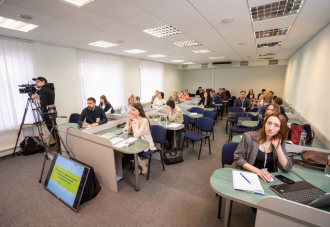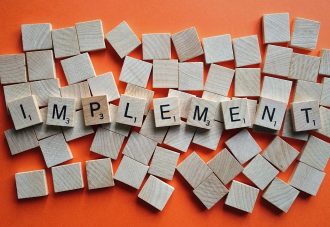Is it realistic to advocate for change in communities during wartime? You can often hear: “It’s not the right time, there are no funds”. So we asked the participants of the Mentorship Program what they planned in early 2022 and whether they succeeded given the challenges posed by the full-scale invasion.
“Advocacy is about change, about what we want to change, what we want to propose, and how we see the solution to a problem,” says Olena Matviichuk, coordinator of the CEDEM Mentorship Program. “On February 23, the official launch of the Mentorship Program 3.0 was announced, and on February 24, our lives changed dramatically. We decided to find out whether the life of the CSO Mentorship Community has changed in terms of ideas and initiatives they planned to implement when they joined the Mentorship Program.”
Who needs standing desks for studying?
Tetiana Kochirko, Let the Children Move CSO
The goal of our organization is to support proactive learning, that is, learning where children can learn by regularly changing their posture between standing and sitting and vice versa. For this purpose, schools use standing desks.
We came up with this idea back in 2018. Before that, we studied international experience, which showed that this methodology improves children’s health, promotes academic success, and has long been successfully used in many countries.
We turned to Ukrainian legislation and found out that Ukraine has outdated standards for the manufacture and installation of school furniture. And this needs to be changed.
So, in 2021, we launched a pilot project in three Lviv schools: We equipped several first-grade classrooms with standing desks. During the lesson, students change their position about every 15 minutes.
At first, they were shocked, but later parents, the principal, the children themselves, and the education department were satisfied, and we received positive feedback.
We involved the O. M. Marzeiev Institute of Public Health in this project to conduct the relevant research and confirm the hypothesis and conclusions of foreign scientists.
Unfortunately, a full-scale war later broke out. Children did not go to school, and we did not know how to continue this pilot project.
Of course, we were confused at first, but thanks to the Mentorship Program and our mentor, we got our thoughts straight, spelled out the details, and I can say that we conducted a successful advocacy campaign during the war. After all, we now have a signed Memorandum with the Department of Education on the installation of standing desks in all Lviv schools.
But we used a bottom-up approach here: We went to the parliamentary commissions, told them about our pilot project and its necessity, and appealed to the Ministry of Education.
Our advocacy campaign was supported by feedback from teachers, parents, and children who had actually tested the desks.
We came to the Department of Education in Lviv with our support: parents, teachers, and school management. We have already had a working meeting on the introduction of these standing desks. Now we are planning to have all Lviv educational institutions use dynamic posture learning.
It was actually difficult. Many people said that it was not relevant because of the war. But we live by this idea and realize that our future lies in healthy, educated and successful children.
And after our victory, when we rebuild Ukrainian educational institutions, we will immediately equip them with standing desks. The way it should be – in a European way, to improve children’s health and cognitive function.
We are now actively working to order the development of national standards, certify them, and ensure that in the future schools throughout Ukraine can freely use such desks.
Thanks to the support of the Mentorship Program, we did not lose heart. If it wasn’t for the program, we would probably have postponed this idea. Instead we achieved great results by moving gradually.
In advocacy, it’s important to understand which body is responsible for what, to approach them with a clear request, to talk about needs, and to believe in your idea.
Do women need to develop entrepreneurship in Kolomyia during the war?
Oleksandra Fomenko, Join and Change NGO
Our initiative was to create an embroidery hub in Kolomyia. After all, Kolomyia is known for its craftswomen, and our embroidery is represented in all shops in Ukraine. And our organization decided to promote the development of women’s entrepreneurship.
We responded to the war, as did many in our country. Some of the members of the NGO went abroad, while the majority stayed there. So we thought that our initiative would not yield any result.
But a month passed and we realized that we had to keep working, that if we abandoned the initiative we were trying to complete, we would never accomplish it.
The Mentorship Program helped us to streamline our activities, and the mentor advised us to first investigate whether the community needs it at all and whether it is possible to implement such a great idea.
Thanks to our participation in the Mentorship Program, we have made this activity systematic, added methodologies and structures to what we had been doing before.
Having gone through this journey, we have gained confidence that our work is necessary, the path we have chosen is the right one, and the project will help develop inclusion, entrepreneurship, and the community as a whole.
After all, with the help of this project, we will revive and preserve ancient traditions and support craftsmen and craftswomen. In this way, we will prolong the life of Ukrainian traditional crafts.
Legislative definition of the status of a community adviser in Ukraine – why now?
Anna Ilashchuk, Head of the Association of Community Advisers of Ukraine
We are a large organization that has been operating for 3 years. In total, the community of community advisers has existed for 5 years, we have the experience of international communities where paralegals (community advisers) are enshrined in law.
Therefore, we were sure that it was our thing, we had to do it.
But after February 24, first of all, paralegals had to be engaged in even more activities in various new areas. And here the question really arose: Do we have the strength and capacity to participate in the Mentorship Program?
However, when we met with our mentor after the full-scale invasion and he was confident and calm, we started working. And it was a long process.
We are satisfied with the result, because in a little more than six months, we have a draft law and an advocacy plan that we are planning to follow.
We are also working on making certain changes to the communication strategy, because we understand that advocacy is impossible without communication, especially at the national level.
We are currently paying a lot of attention to defining the concepts of “community adviser” and “paralegal” in Ukraine.
And as a bonus in these six months we joined the RPR Coalition, our mentor organization, and are now implementing our first mini-initiative. This is a training program for community advisers on the topic of Ukraine’s recovery.
After all, we understand that civil society must have its own voice, which must be heard in communities. To do this, we need to understand what processes are being restored, what is happening in Ukraine, and how residents and civil society can influence the reconstruction.
It is thanks to the expertise, openness, calmness, and confidence of our mentor that we have truly gotten the most out of the Mentorship Program. And we plan to continue to follow our advocacy plan to gain legislative recognition in Ukraine.
After February 24, we talked about changing our initiative a bit. We realized that there were much more important requests at the national level. However, having gone all the way, we realize that our topic is very timely. That is why, with the participation and support of our mentor, we have the strength and confidence to move forward in our direction.
Why is the issue of social security for migrants so important?
Yaryna Khomtsii, Head of the Damo Radu Agency
Our organization works with the issue of social security for migrants. We have international partners – the Italian organization Patronato ACLI. We have been working with them as the Damo Radu Agency for 3 years, but we started working together back at the Charitable Foundation “Zaporuka”. So in total, our cooperation is already 9 years old.
During this time, we have helped more than 4.5 thousand of our Ukrainian migrants to receive pensions for their work in Italy. These are millions of euros in payments that come to Ukraine every month. We understand that social benefits are a basic income, and this is always a very urgent need.
Since the full-scale invasion, the biggest challenge we initially faced was to be able to keep this service in general. We fought for it.
We have been with the Mentorship Program since 2020. When Covid was spreading, we started working in the field of advocacy, and we are very grateful to the Mentorship Program 1.0 for strengthening our advocacy capacity.
And now we are facing the second challenge.
Because of these challenges, we are strengthening our advocacy capacities and our ability to help exercise the rights of Ukrainian migrants.
We have set a very ambitious goal. But this goal stems from our many years of activity – to maximize the rights of Ukrainian migrants to social security.
That is, if a person has worked in Ukraine and worked in Italy, then his or her seniority should not be lost, not a single year or month should be lost. Despite the fact that before the full-scale invasion of Ukraine, there were more than 200,000 people in Italy, Ukraine does not have a social security agreement with this country. So we set out to work on this.
After February 24, it was difficult for us to implement such a global issue in circumstances where we were trying to maintain our core service – give people a base, their income, and help them get their money back. So there were a lot of challenges that we had to overcome.
But in the Mentorship Program 3.0 we had an incredible mentor who strengthened our advocacy capacity. We are on our way – together with her, we are very inspired by her, we see her personal advocacy victories.
We have updated our advocacy plan and reviewed the needs of migrants. After all, in 2020, there was one category of migrants, and now migrants have gone to all countries of the world. We see that other migrants have come to Italy with different needs.
However, the issue of social security definitely remains relevant both for those who have already worked in Italy and for new migrants who have left and some of whom will stay.
We can also understand the rights of migrants better because one of our colleagues was on an internship with our partners due to the challenges of the war. On the one hand, it was a challenge for our organization because there were fewer of us here, but on the other hand, it was a huge opportunity.
That’s why our big international advocacy project is on the way. But we are confident that we are moving, and we know that Ukraine has great opportunities now.
We hope to take advantage of these opportunities both in Ukraine and abroad, both through our partnerships and hopefully through the world’s attention to Ukraine.
I believe that our work is not finished, but a lot has been done, a lot has been worked out, and we are moving forward.
The material was prepared by Kseniia Ditchuk
Mentorship Program is implemented as part of the Project “Ukraine Civil Society Sectoral Support Activity” implemented by the Initiative Center to Support Social Action “Ednannia” in partnership with the Ukrainian Center for Independent Political Research (UCIPR) and Centre for Democracy and Rule of Law with the sincere support of the American people through United States Agency for International Development.



